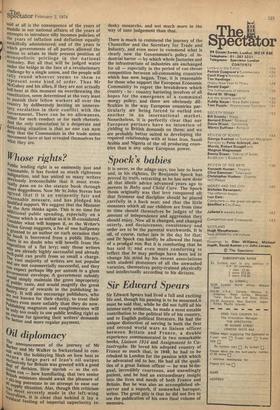Whose rights?
Public lending right is so eminently just and r.easonable, it has fueled so much righteous Indignation, and has united so many writers Previously irreconcilable that it must even ally pass on to the statute book through sneer doggedness. Now Mr St John Stevas has agreed that it is an eminently fair and reasonable measure, and has pledged his 9Ualified support. We suggest that the Minister 'c'r the Arts thinks again. This is no time for additional public spending, especially on a vseheme which is as unfair as it is ill-considered. 10i'isider what will happen if, as the Writer's .etion Group suggests, a fee of one halfpenny list granted to an author on each occasion that book is borrowed from a public library. Luere is no doubt who will benefit from the b.,""Position of a flat levy; only those writers ;To are already highly successful and already IZII-Paid can profit from so small a charge. vast majority of writers are not popular nd are not commercially successful, and they 'an expect perhaps 50p per annum in a glum gwovernment envelope. A government subsidy of°tIld simply maintain the gross impropriety di Public taste, and would magnify the gross dhscrepancy of rewards in the publishing inar'strY. It will also encourage publishers, who not known for their charity, to treat their :b:Titers even more unfairly than they do now. /3lishing magnates and conglomerates will an °NY too ready to use public lending right as excuse for ignoring their writers' demands ur better and more regular payment.


































 Previous page
Previous page